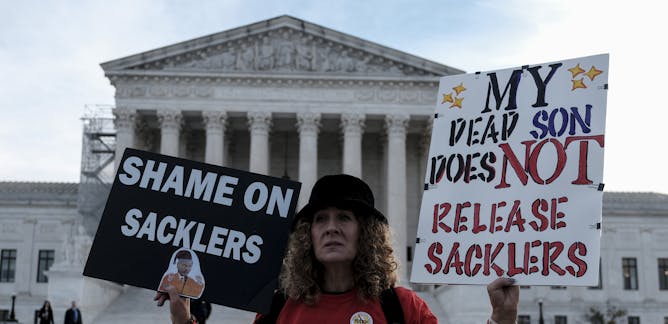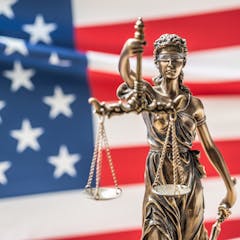
Artículos sobre Neil Gorsuch
Mostrando 1 - 20 de 35 artículos

The company helped spur a public health crisis through its deceptive marketing and aggressive sales of prescription opioids.

Critics are decrying the long time the Supreme Court has taken to rule in a crucial Trump case, charging that it’s politically motivated to help Trump. A scholar of the court says they’re wrong.

Are concerns about Supreme Court justices’ ethics an old problem, a new one, political gamesmanship, or something more serious? Yes to all of it.

Pundits decried the Supreme Court justices for not focusing on Donald Trump’s conduct when they heard oral arguments in Trump’s immunity case. But a legal scholar says they were just doing their job.

A retired federal judge examines the oral arguments the Supreme Court heard on a case in which Colorado has blocked former President Donald Trump from the ballot.

Courts have no army or police force to enforce their decisions. Their power rests on their legitimacy in the public eye. How does scandal affect that?

A satirist posted a parody of a police Facebook page. He was arrested and jailed for four days. How far do free speech protections extend when it comes to satire about government?

For the past 50 years, the Supreme Court has issued rulings that narrow tribal rights while Congress has worked to expand them. A recent ruling struck yet another blow against Native sovereignty.

The justices who decided to overturn the abortion rights precedent of Roe v. Wade explained their reasoning, and signaled other precedents could be reversed as well.

If the Supreme Court overturns Roe v. Wade, will it be out of step with America?

There is value in observing legal precedent, but sometimes circumstances, logic or judges’ views determine it’s time to overturn it.

Many states have found ways to remove partisan politics from their court systems.

The US Supreme Court is often less insulated from partisan politics than many Americans assume.

Many Supreme Court nomination battles depended on whether the president’s party also had control of the US Senate.

A 6-3 conservative court will hear a broader range of controversial cases, shift interpretations of individual rights and put more pressure on local democracy to make policy decisions.

With a new vacancy on the US Supreme Court, Donald Trump has the opportunity to alter the court’s direction for decades. He’s not the first.

Justice Neil Gorsuch joined the Supreme Court as a conservative. But his ruling in a major civil rights case is part of a pattern of justices setting aside ideology to address historic injustices.

The US Supreme Court has ruled that the Civil Rights Act applies to LGBT people. A business law scholar explains why this is one of the most consequential discrimination cases in decades.

In a national survey, transgender individuals had worse employment outcomes, lower incomes and higher rates of poverty than cisgender people.

Federal law now protects lesbians, gay men and transgender people from being fired or otherwise discriminated against at work. But there are more questions and court cases to come about their rights.
